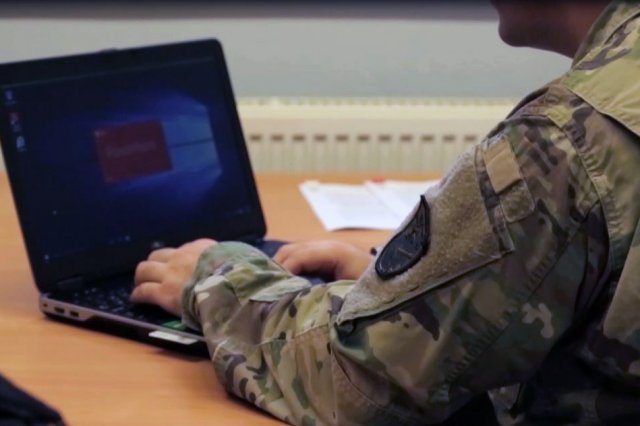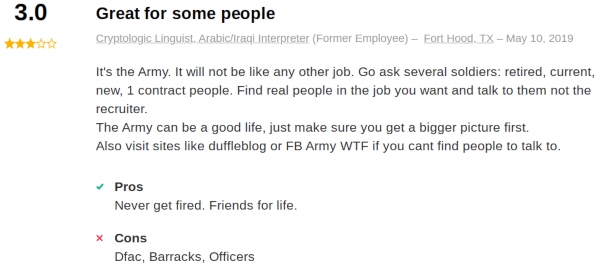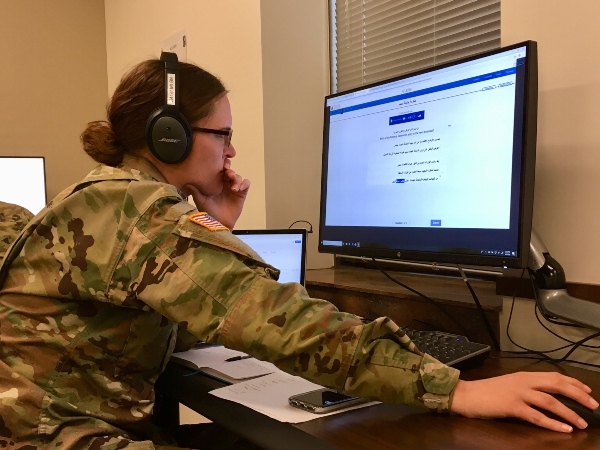Army Signals Intelligence (SIGINT) Voice Interceptors (MOS 35P) identify foreign communications.
They use signals equipment to help track down foreign communications.
The position of an Army Signals Intelligence Voice Interceptor is important to national security.
It is also similar to the role of an Army Signals Intelligence Analyst (MOS 35N) with the exception that an MOS 35P also needs to understand a second language.
Related Article – Army Human Intelligence Collector (MOS 35M): Career Details
Education, Qualifications, Training, and Duty Stations

The U.S. Army relies on Signals Intelligence Voice Interceptors (MOS 35P) for national security.
The information that an Army Signals Intelligence Voice Interceptor is able to identify is generally spoken or worded in a foreign language, so knowledge of a second or even third language is required.
Here are all the Education, Qualifications, Training, and Duty Stations you need to become 35P MOS:
Education
You won’t be able to enlist in the U.S. Army without a high school diploma or GED.
After speaking with an Army recruiter, you will eventually take the Armed Services Vocational Aptitude Battery (ASVAB) at a nearby high school or MEPS station.
The ASVAB is an assortment of tests that help determine a Military Occupational Specialty (MOS).
Prospective Signals Intelligence Voice Interceptors (MOS 35P) must complete a score of Skilled Technical (ST): 91.
Additionally, Signals Intelligence Voice Interceptors must complete the Defense Language Aptitude Battery (DLAB).
The DLAB evaluates how well a native English speaker can learn a new language.
Your score on the DLAB determines the level of difficulty for language training and if you are the right fit for 35P MOS.
You must receive a qualifying score of 100 or above on the DLAB.
Related Article – Air Force Airborne Cryptologic Linguist (1A8X1): Career Details
Qualifications
Prospective Army Signals Intelligence Voice Interceptors (MOS 35P) must also receive a “Top Secret” security clearance from the Department of Defense in addition to scoring well on the ASVAB and DLAB.
The background check for a Top Secret clearance is intensive.
A record of conviction by court-martial or civil court for any offense other than minor traffic violations is grounds for removal.
The Department of Defense will also not allow anyone that has served in the U.S. Peace Corps to become an Army Signals Intelligence Voice Interceptor, to ensure the safety of future Peace Corps workers.
Recruits are also expected to demonstrate good voice quality.
They should speak the English language, as well as an additional foreign language, “fluently and idiomatically, without accent or impediment.”
Lastly, 35P MOS must have normal color vision (no color blindness).
While not mandatory, the Army also suggests that prospective MOS 35P demonstrate an interest in speech, communications, and foreign languages.
Those that enjoy reading and writing, as well as being good at working with people, will make great additions to the Army’s intelligence team.
Related Article – Army Interpreter (MOS 09L): Career Details
Training
Once you begin your journey in the U.S. Army, you will arrive at boot camp or Basic Combat Training.
BCT lasts 10 weeks for all new recruits, regardless of Military Occupational Specialty.
After the completion of BCT, you will move forward to Advanced Individual Training (AIT).
Like many other US Army careers, AIT for Army Signals Intelligence Voice Interceptors (MOS 35P) is incredibly in-depth.
You will spend six to 18 months of Advanced Individual Training mastering another language and learning more about the job duties of 35P MOS.
Training takes place at the Defense Language Institute Foreign Language Center (DLIFLC) in Monterey, California.
The DLIFLC is a joint service school managed by the Army but also supervised by the Department of Defense.
If you already fluently speak a foreign language, you may receive permission to bypass DLIFLC training.
If not, the amount of time you spend there will depend on how quickly you master a second language.
You will learn how to identify foreign communications from an assigned geographic area.
You will also analyze foreign communications to support missions.
There is also training dedicated to procedures for handling classified information and preparing reports.
Related Article – Navy Cryptologic Technician Interpretive (CTI): Career Details
Duty Stations
Those serving in the Army in MOS 35P can expect to be potentially based at one of the following duty stations:
Inside the Continental US (CONUS)
- Fort Bliss, TX
- Fort Campbell, KY
- Fort Carson, CO
- Fort Cavazos, TX
- Fort Drum, NY
- Fort Gordon, GA
- Fort Irwin, CA
- Fort Johnson, LA
- Fort Liberty, NC
- Fort Meade, MD
- Fort Moore, GA
- Fort Riley, KS
- Goodfellow AFB, TX
- Joint Base Lewis-McChord, WA
- Joint Base San Antonio, TX
Outside the Continental US (OCONUS)
- Fort Wainwright, AK
- Joint Base Elmendorf-Richardson, AK
- USAG Bavaria, Germany
- USAG Hawaii
- USAG Humphreys, South Korea
- USAG Italy, Vicenza
- USAG Wiesbaden, Germany
- USAG Yongsan-Casey, South Korea
What does an Army Signals Intelligence Voice Interceptor Do?

As we mentioned at the beginning of this article, the role of an Army Signals Intelligence Voice Interceptor (MOS 35P) is very similar to the position of a Signals Intelligence Analyst (MOS 35N).
The purpose of both Military Occupational Specialties is to identify foreign language communications with signals equipment.
The biggest difference between MOS 35P and MOS 35N is that Army Signals Intelligence Voice Interceptors must know a second language.
Job Duties of 35P MOS
A Signals Intelligence Voice Interceptor (MOS 35P) has an important job in combat situations that take place in foreign countries where there is a language barrier.
The role of 35P MOS involves a lot more than just translating and communicating foreign languages.
Your job duties will include:
- Identify and analyze foreign communications.
- Recognize changes in transmission modes as well as tip the appropriate authority.
- Provide translation expertise to other analysts.
- Produce transcriptions and translations from foreign communications.
Army Signals Intelligence Voice Interceptors use signals equipment based on a geographic area to retrieve signals and categorize them by type.
Signals Intelligence Voice Interceptors are skilled at recognizing changes in transmission modes and tipping the appropriate analytical or intercept authority.
Related Article – List of Army Bases in the US
What does an Army Signals Intelligence Voice Interceptor make?

The Army pays its service members based on rank and years of service.
Your pay is not tied to your Military Occupational Specialty (MOS), although occasionally the Army will offer retention bonuses or special allowances for hazardous jobs.
For an idea of how much you will make in the U.S. Army based on rank, please reference the table below:
| Insignia | Pay Grade | Rank | Abbreviation | Minimum Monthly Pay |
|---|---|---|---|---|
| E-1 +4 months | Private | PVT | $1,917.60 | |
| E-2 | Private Second Class | PV2 | $2,149.20 | |
| E-3 | Private First Class | PFC | $2,259.90 | |
| E-4 | Specialist | SPC | $2,503.50 | |
| E-4 | Corporal | CPL | $2,503.50 | |
| E-5 | Sergeant | SGT | $2,730.30 | |
| E-6 | Staff Sergeant | SSG | $2,980.50 | |
| E-7 | Sergeant First Class | SFC | $3,445.80 | |
| E-8 | Master Sergeant | MSG | $4,957.20 | |
| E-8 | First Sergeant | 1SG | $4,957.20 | |
| E-9 | Sergeant Major | SGM | $6,055.50 | |
| E-9 | Command Sergeant Major | CSM | $6,055.50 | |
| E-9 | Sergeant Major of the Army | SMA | $6,055.50 |
Benefits
The U.S. Army has numerous benefits included with a monthly salary:
- Medical Insurance
- Vacation Time
- Special Pay
- Retirement
- Housing: Allowances for living expenses, utilities, and maintenance.
- Food: Allowance for the on-base dining hall and access to tax-free department and grocery stores.
- Education: Army members can earn full tuition, merit-based scholarships, allowances for books and fees, plus an annual stipend for living expenses.
Job Reviews
There are some very good job reviews about working as an Army Signals Intelligence Voice Interceptor (MOS 35P) on Indeed.com.

The job reviews break down the good and bad about the U.S. Army.

Regardless, the vast majority of reviews have very good things to say about the opportunities and ability to progress working MOS 35P.

Related Article – Army Intelligence Analyst (MOS 35F): Career Details
Civilian Job Opportunities
There are several Signals Intelligence Voice Interceptors (MOS 35P) that advance with government agencies or embassies following the conclusion of their service term with the Army.
You can work as a translator for agencies like the Department of Defense or the National Security Agency (NSA).
Additionally, places like universities and businesses that conduct operations overseas are in need of highly qualified translators.
Other Army Signals Intelligence Voice Interceptors advance to serve as radio operators, database administrations, business operations specialists, or computer operators.
Summary
An Army Signals Intelligence Voice Interceptor (MOS 35P) is responsible for identifying foreign communications with signals equipment.
The role is very important to national security and can advance you into a career with a government agency following your term in the U.S. Army.
Resources:
- https://www.goarmy.com/careers-and-jobs/browse-career-and-job-categories/intelligence-and-combat-support/cryptologic-linguist.html
- https://www.indeed.com/cmp/U.S.-Army/reviews?fjobtitle=Cryptologic+Linguist
- 68 Series MOS: A List of Medical Field Jobs in the Army - June 19, 2024
- 15 Series MOS: US Army Aviation Jobs - June 19, 2024
- 11 General Orders For Each Military Branch - June 19, 2024
General FAQ
What does a Signals Intelligence Voice Interceptor do in the army?
An Army Signals Intelligence Voice Interceptor (MOS 35P) identifies spoken foreign language and other communications in support of Military Intelligence. Knowledge of a second language is mandatory.
Which military branch is best for linguistics?
The Army, Navy, Air Force, and Marine Corps all have occupations requiring a foreign language. Each service has its pros and cons, but the Air Force and Navy emphasize technology, while Army and USMC will have you seeing more action.
What kind of security clearance do I need to become a Signals Intelligence Voice Interceptor?
To become an Army Signals Intelligence Voice Interceptor (MOS 35P), you’ll undergo an extensive security check and need to obtain a Top Secret clearance. This means your criminal, credit, and health records will be scrutinized.
How long is Army linguist school?
After Basic Training, you’ll undergo 6 to 18 months of intensive language training at the Defense Language Institute Foreign Language Center in Monterey, California. The length of training will depend on your language proficiency.
What ASVAB score do I need to be a Signals Intelligence Voice Interceptor?
To become an Army Signals Intelligence Voice Interceptor (MOS 35P), you’ll need a minimum score of 91 on the Skilled Technical portion of the ASVAB, as well as a minimum score of 100 on the Defense Language Aptitude Battery (DLAB).

